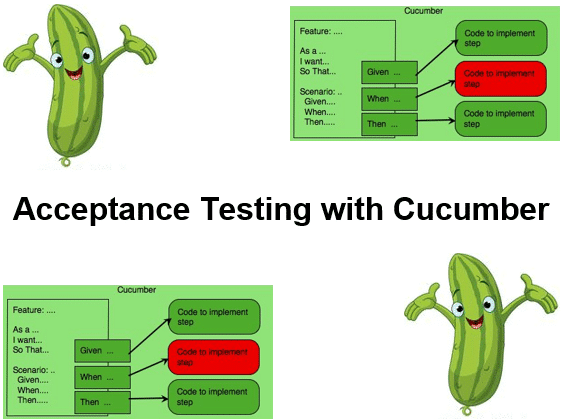-
Learning by doing
-
Trainers with practical experience
-
Classroom training
-
Detailed course material
-
Clear content description
-
Tailormade content possible
-
Training that proceeds
-
Small groups
The course Acceptance Testing with Cucumber discusses how Cucumber can be used in combination with the Gherkin scenario language to write the specifications for automated acceptance tests.
Cucumber is a Behavior Driven Development tool that allows test scenarios in plain language to be drawn up in consultation with the client and end user. The scenarios are also intended for developers and serve as input for the generation of automated test scripts in a programming language and test framework.
The course Acceptance Testing with Cucumber focuses on the preparation of Feature files, the syntax of the Gherkin specification language and the creation of a template file for the step definitions. Various Cucumber configuration options are discussed.
Data Driven testing with Cucumber and the parameterization of tests are also on the program of the course Acceptance Testing with Cucumber. Also attention is paid to the implementation of hooks that are performed before, after or during a test step.
Finally, Cucumber tags, Cucumber expression language and integration with the JUnit Test Framework are discussed.
The course Acceptance Testing with Cucumber is basically done with Java as a programming language and Maven for bringing in Cucumber and JUnit dependencies, but on request the course can also be done with Ruby and RSpec.
The course Acceptance Testing with Cucumber is intended for testers, developers and others who want to use Cucumber and Gherkin for the specification of automated tests.
Experience with testing is required. Experience with basic programming principles is recommended, but is not strictly necessary.
The theory is explained on the basis of presentations and demos. Several scenarios are implemented as exercises. Theory and practice are interchanged. The course times are from 9.30 to 16.30.
Participants receive an official certificate Acceptance Testing with Cucumber after successful completion of the course.

Module 1 : Cucumber Intro |
Module 2 : Gherkin Keywords |
Module 3 : Step Definitions |
|
Test Driven Development Steps in TDD What is BDD? BDD’s Evolution BDD Second generation User Stories Scenarios BDD Tools Cucumber Features Scenarios |
What is Gherkin? Gherkin Syntax Feature Files Gherkin Keywords Feature Keyword Background Keyword Scenario Keyword Given and When Keyword Then and And Keyword But Keyword * Keyword |
Step Definitions Step Definition File Step Template Automation Script Step Implementation Cucumber Options dryRun Option monochrome Option features Option glue Option format Option |
Module 4 : Data Driven Testing |
Module 5 : Cucumber Hooks |
Module 6 : Cucumber Tags |
|
Parameterization Scenario Outline Executing Examples Data Tables Raw Methods Maps in Data Tables Test Step Implementation Matching Steps Failed Steps |
What are hooks? Scenario Hooks Before Hook After Hook Lambda Style Around Hook Step Hooks BeforeStep and AfterStep Tagged Hooks |
What are Tags? Scenario Subset Scoping Hooks Tag Placement Tag Inheritance Tag Expressions Run Scenario Subset Ignoring Scenarios Tags for Documentation |
Module 7 : Cucumber Expressions |
Module 8 : JUnit Integration |
|
|
Comparison to Regular Expressions Parameter Types Built-in Parameter Types int and float word and string anonymous Custom Parameter Types Optional text Alternative Text Escaping |
What is JUnit? JUnit Integration Assert Statements Assert Class Fixtures Annotations Test Suites Suite in Suite Suite TestRunner Parameterized Tests |
